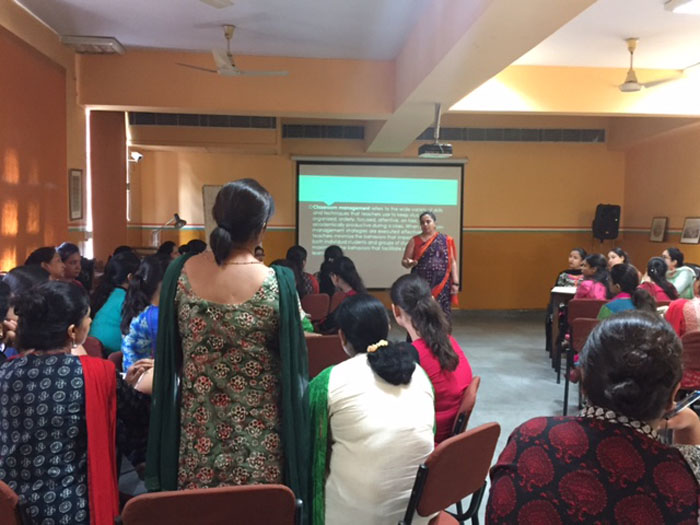Principal's workshop for teachers on classroom management
It was a good opportunity for the teachers to sit across the teacher's table,( literally)and take lessons from our Principal, Ms. Tania Joshi and Vice Principal and Counsellor Ms. Sukhmeen Cheema!
With their valuable experience and knowledge, the teachers were educated about the various ways of effective Classroom Management. The workshop was conducted in the AV room on 22 July, 2017.
The session started with a question thrown at us, What is classroom management?
The teachers replied with various answers like:
1. Involvement of each student.
2. Having interactive sessions.
3. Maintaining discipline.
4. Achieving objectives set.
5. Making the students comfortable- physically, psychologically and emotionally.
6. Well planned sessions.
7. Activity based learning, etc.
Here, our Principal corrected us by showing a video which explained that Discipline is one of the most important ways of effective Classroom Management. The other attributes are merely skills and techniques to keep the child involved and organised.
She highlighted that there is no set or best strategy for classroom management. It is a continuous and an evolving process.
The workshop was made interesting when a video was played on Behavioural Classroom Tips, where the importance of sign language was conveyed, like raising of a single finger to pose a question or two fingers to indicate going to the toilet. It could be an effective way to communicate whilst saving energy for both the teacher and the student.
Ms. Cheema explained that it is not always necessary to reward the student with material things for any good work; it is most important to praise the student and his/ her intrinsic values which creates a great feeling of self motivation. Even drawing a smiley work wonders for students. Hereby children learn to work for intrinsic rather than just material gains.
[gallery link="file"]
Within groups some innovative practises were discussed keeping the following parameters in mind:
1. Physical Setting: This emphasised the need to form small groups so that each student can be given attention and encouragement.
2. Attention Grabber: When required to 'grab' the attention of students, one can ring a bell, blow a whistle wave a puppet, clap, sing out a rhyme etc. These work much better than simply shouting and scaring the child.
3. Tone: a modulation of one's tone is very important. A perfect balance should be maintained to not scare the child even whilst keep him/ her engaged in the discussion.
4. Transition or Changing Activities: A reverse counting from 10 to 1 will make the children
understand the importance of time and of completing assigned tasks on time.
5. Rules and routine: a schedule of class rules should be worked out for a fair distribution of work for the students, for example, ' Distribution-in-charge', 'Line leader-in-charge', etc.
6. Attendance: To inculcate the habit of regular attendance, a classroom calendar can be used to award students who are present the whole week, motivating others to follow.
7. Morning Rituals:Inculcating good habits of starting every new day or a project with a prayer will teach kids moral values and strengthen their faith in themselves. Moreover,welcoming the child at the door and shaking hands with him/ her will make him feel loved and encouraged.
8. Afternoon Dismissals: Its always important to end every session in a disciplined manner and to end the day with a prayer. Children should learn to maintain discipline by moving out as per the dispersal plan and leaving the classroom in an organised manner.
9. Speaking/answers: Children should learn to speak at the right time and when given an opportunity. It is important to teach the children to ask for permission before speaking by raising hands.
Other tips discussed were:
Maintaining a fair volume level while addressing the class.
Giving the class a new word to ponder about
when going out of class. This will help the children extend their vocabulary.
The workshop concluded with a closing thought, The lesson plans can never fairly evaluate the need and requirement of a child so one should be constantly ready to change and adopt a fair and practical approach to teach the young kids.
Ms. Mayur Bose.













